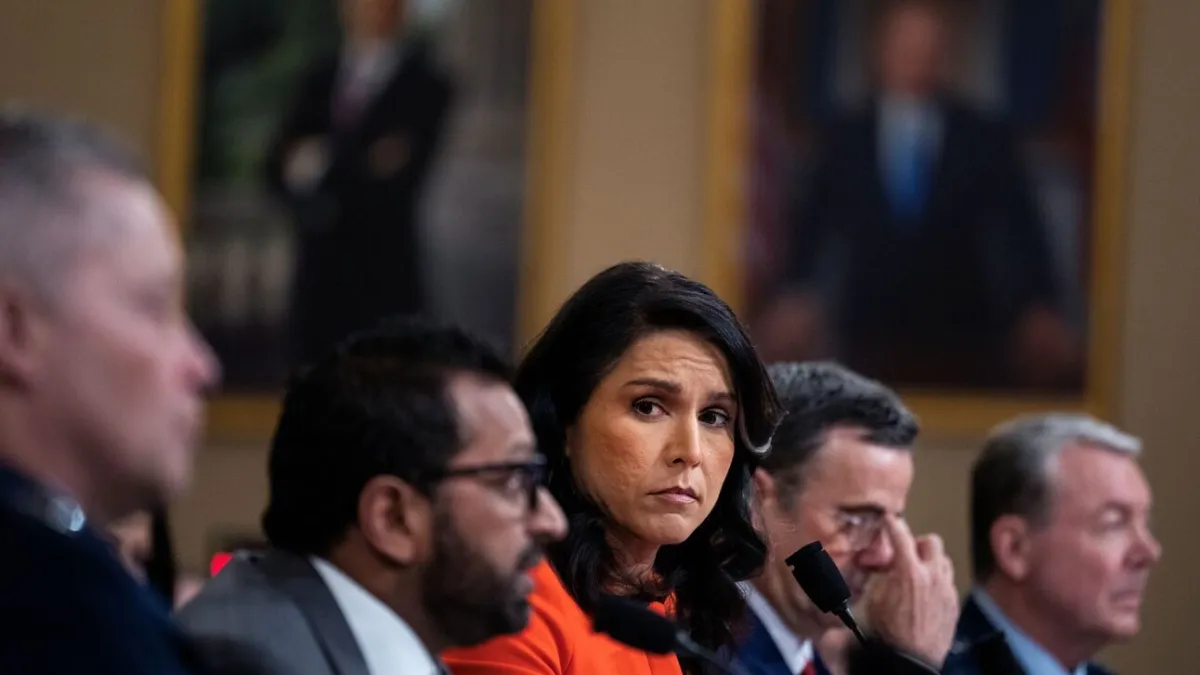
The security breach that’s been dubbed SignalGate continues to dominate headlines and consume official Washington.
After President Donald Trump and key administration intelligence officials maintained Monday that no classified information was shared in the Signal group chat that accidentally included journalist Jeffrey Goldberg — and after Defense Secretary pugnaciously insisted that he had not shared “war plans” — The Atlantic on Tuesday morning published more messages from the exchange. The texts showed that Defense Secretary Pete Hegseth shared operational plans and some details on the commercial app, including the types of aircraft involved and the timing of strikes against the Houthis in Yemen.
Democratic lawmakers used those fresh details to again tear into Trump officials including Tulsi Gabbard, the director of national intelligence, and CIA Director John Ratcliffe, who were testifying on Capitol Hill for a second straight day, this time in a testy hearing before the House Intelligence Committee after a similar session on the Senate side yesterday.
Gabbard acknowledged that having a reporter included in the group chat was a “mistake” and added that National Security Adviser Mike Waltz has taken responsibility and that a review is being conducted. But she again said that the information shared wasn’t classified. “The conversation was candid and sensitive, but as the president and national security advisor stated, no classified information was shared,” Gabbard said. “There were no sources, methods, locations or war plans that were shared.”
Democrats were incredulous. “The idea that this information, if it was presented to our committee, would not be classified, you all know, is a lie,” Democratic Rep. Joaquin Castro of Texas said to the Trump officials. And Rep. Raja Krishnamoorthi of Illinois insisted that, despite the claims of administration officials, the messages included information that clearly was classified. “Secretary Hegseth has disclosed military plans as well as classified information,” he said. “He needs to resign immediately.”
Other Democrats also called for the resignations of Hegseth, Waltz and other officials involved in the chat.
In a social media post and in remarks to reporters, Hegseth remained defiant. “So, let’s me get this straight,” he wrote. “The Atlantic released the so-called ‘war plans’ and those ‘plans’ include: No names. No targets. No locations. No units. No routes. No sources. No methods. And no classified information. Those are some really shitty war plans.”
Hegseth, the White House and other administration officials also attacked Goldberg, adopting an aggressive if disjointed messaging strategy. “We are not going to bend in the face of this insincere outrage,” White House Press Secretary Karoline Leavitt said at her press briefing Wednesday afternoon. In a social media post, she wrote: “This entire story was another hoax written by a Trump-hater who is well-known for his sensationalist spin.”
The president on Wednesday decried the furor over the chat and the national security concerns it raised in familiar terms, calling it a “witch hunt.”
Republicans at Wednesday’s hearing often echoed the administration’s defenses, but some key lawmakers have scoffed at those efforts to deflect and downplay. “The White House is in denial that this was not classified or sensitive data,” Rep. Don Bacon, a former Air Force general, told reporters. “They should just own up to it and preserve credibility.”
Republican Sen. Roger Wicker, the chair of the Senate Armed Services Committee, said that he and Sen. Jack Reed, the top Democrat on the committee, are “very concerned” about the use of Signal and have agreed to request an investigation by the Department of Defense Office of Inspector General into the matter. “The information as published recently appears to me to be of such a sensitive nature that, based on my knowledge, I would have wanted it classified,” Wicker said.
The bottom line: Despite the Trump administration’s efforts, this isn’t going away.